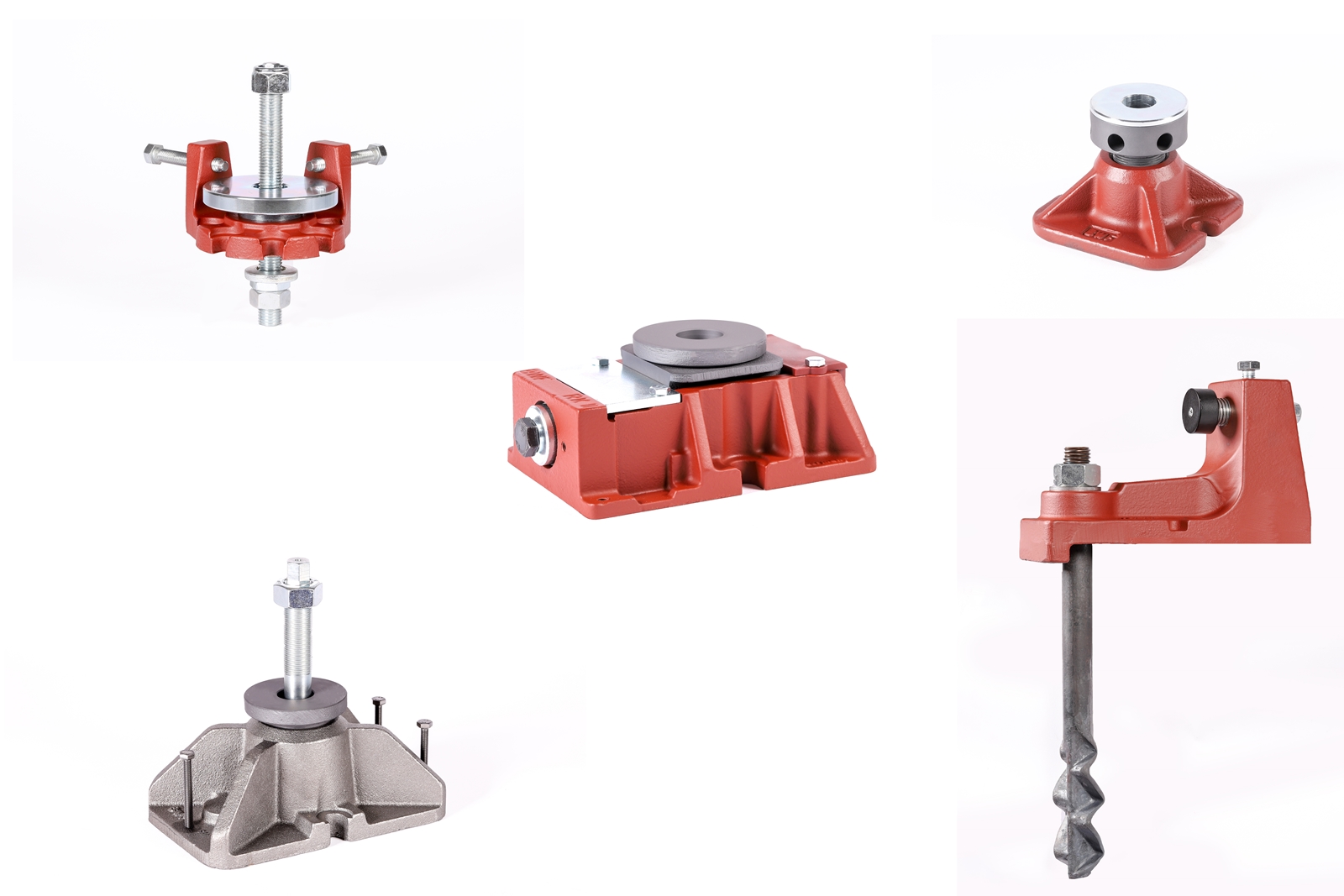General Terms and Conditions of Fixatorenbau Bertuch & Co. GmbH
As of 13.02.2019
Clause 1 Scope
(1) All supplies, services and offers of Fixatorenbau Bertuch & Co. GmbH (also referred to as “Seller” in the following) take place only on the basis of these General Terms and Conditions (GTC). These form an integral part of all contract agreements that the Seller concludes with his contract partners (also referred to as “Buyer” in the following) for the supplies and services they offer. They are also applicable to all supplies, services or offers made to the Buyer in the future, even if they are not agreed on separately.
(2) Otherwise, for installation services by the Seller only his installation terms and conditions are applicable in the respective valid version.
(3) The GTC of the Buyer or third parties are not applicable even if the Seller does not contradict their validity in specific cases. Even if the Seller makes reference to a letter that contains terms and conditions of the Buyer or a third party, there is no agreement with the validity of any of these terms and conditions.
Clause 2 Offer to Contractor
(1) The Seller provides the supplies, services and offers only to Contractors who procure them for their independent, professional or commercial activity. The supplies, services and offers of the Seller are explicitly not aimed at consumers.
Clause 3 Offer and conclusion of the contract
(1) All offers made by the Seller are subject to confirmation and non-binding, provided that they have not specifically been marked as binding or contain a certain acceptance period. Offers or presentations on the websites of the Seller do not represent any binding contractual offers. They are only an invitation to the Buyer to submit an offer based on this presentation.
(2) The Seller may accept offers of his choice within 3 weeks by sending a written order confirmation or by dispatching the goods ordered.
(3) What is solely decisive for the legal relationships between the Buyer and Seller is the concluded written purchase agreement, including these GTC. This reflects all agreements completely between the parties to the contract for the subject matter of the contract. Any consulting or verbal commitments made by the Seller before concluding this purchase agreement are not legally binding.
(4) Any supplements or amendments to the agreements made including these GTC must be in writing for them to come into effect. With the exception of Directors or authorised signatories, the employees of the Seller are not authorised to make any verbal agreements deviating from those contained herein.
(5) Information about the Seller on the subject matter of the supply or service (e.g. weights, dimensions, consumption values, load-bearing capacity, tolerances and technical specifications) as well as our illustrations of the same (e.g. drawings and figures) are only approximate, provided that the usability for the contractually foreseen purpose does not require them to be exact. They are not any guaranteed features of qualities or characteristics, but descriptions or labels of the supply or service. Commercially prevalent deviations and deviations that occur due to statutory regulations or represent technical improvements, as well as the replacement of components by equivalent parts are permissible, provided that they do not impair or adversely affect the usability for the contractually foreseen purpose.
(6) The Seller is authorised to affix his company’s text, corporate logo as well as special product data on supplies of all kinds, particularly if the performance or the purpose of the contract is not adversely affected.
Clause 4 Prices / Payment / Supply
(1) The prices are given in EURO without packaging and excluding the statutory Value Added Tax (VAT) “ex-Works”, at the registered office of our respective branch office. Additional or special services are billed separately.
(2) Invoice amounts have to be paid within 30 days from the date of the invoice without any deduction whatsoever, provided that nothing to the contrary has been agreed to in writing and the Buyer does not first default in payment by way of a reminder notice. What is decisive for the date of payment is the receipt of the payment by the Seller. Cheques are considered as payment only after they have been cashed. If the Buyer does not pay on the due date, the outstanding amounts are charged interest starting from the due date at 9 % p. a. above the basic interest rate; the right of enforcing higher rates of interest and other losses or damage in case of delayed payment remain unaffected.
(3) The Seller is authorised to provide outstanding supplies or services only against payment in advance or against a security, if he becomes aware of circumstances after concluding the contract agreement, which are appropriate for reducing the credit-worthiness of the Buyer and due to which the payment of the outstanding receivables of the Seller by the customer from the respective contractual relationship (including from other individual orders, for which the same framework agreement is applicable) is at risk.
(4) Any discounts mutually agreed to lapse provided that the Buyer is in default of payment against invoices issued by the Seller or in case of an application and / or initiation of insolvency proceedings with respect to the assets of the Buyer.
(5) Delivery periods and delivery dates promised by the Seller, in case of default in payment, do not represent any express agreement of a “specified date” in the context of Article 323, paragraph 2, item 2 of the BGB (German Civil Code). Withdrawing from the contract agreement by the Buyer is ruled out in this case.
(6) The risk of incidental loss of the goods for purchase on dispatch gets transferred to the Buyer at the time that they are handed over to the freight forwarder or shipper or the person appointed for delivery.
(7) The Seller is not liable for being unable to supply or for delays in supply provided that these have been caused by force majeure conditions or other events not foreseeable at the time of concluding the contract (e.g. operational disruptions of all kinds, difficulties in procurement of material or energy, transportation delays, strikes, lawful lockouts, shortages of manpower, energy or raw materials, difficulties in the procurement of the official approvals necessary, official actions or pending, incorrect or untimely supply by vendors), which are not attributable to the Seller. Provided that such events make the provision of supply or service significantly difficult or impossible, and the hindrance is not only for a temporary period, the Seller is entitled to withdraw from the contract agreement.
(8) If the Seller defaults on the provision of a supply or service, or this becomes impossible for him, regardless of the reason, the liability of the Seller is limited to compensation of loss or damage in accordance with Clause 6 of these GTC.
Clause 5 set-off
(1) Setting off payments with counter-claims of the Buyer or retention of payments on account of such claims is only permissible if the counter-claims are undisputed or legally binding.
Clause 6 Warranty / Liability
(1) Warranty rights of the Buyer assume that he has fully complied with his obligations for examination and registering complaints in accordance with Article 377 of the HGB (German Commercial Code).
(2) If the item supplied by the Seller has a defect at the time of transfer of risk, the Seller is first authorised to eliminate the defect either by repair of replacement of supply according to his choice. In case of failure, i.e. repair or replacement of supply is impossible, unreasonable, denied or unreasonably delayed, the Buyer may withdraw from the contract or reduce the purchase price reasonably. If a defect is attributable to default on the part of the Seller, the Buyer may demand claim for compensation under the conditions provided for in Clauses 6 to 8 of these GTC.
(3) The liability of the Seller for compensation claims, regardless of the legal justification, especially on grounds that delivery is impossible, delayed, defective or incorrect, contract infringement, violation of obligations with regard to contractual negotiations or forbidden action, provided that he is at fault, is limited in accordance with this Clause 6.
(4) If the defect is attributable to the Seller, the claim for compensation by the Buyer is limited to compensation for damage to the item sold and to such damages for which the Seller has taken over express warranty obligation in writing.
(5) If any other contractual obligation is violated by way of minor negligence or if the Seller delays in providing his supply or services, the liability of the Seller is limited to reasonably foreseeable and average damage typical for such a contract. In case of contractual obligations being infringed on due to a minor negligent violation, any liability is ruled out.
(6) The Seller is not obliged to check goods that he sells merely as a dealer (that he has therefore not manufactured), to ensure they are free from defects. In the context of Article 276 of the BGB (German Civil Code) the Seller is not culpable if the goods sold have defects that can be identified only by examination. For supplies in third-party deals, the supply of a defective item basically does not constitute any obligation for representation in the context of Article 276 of the BGB (German Civil Code).
(7) The above-mentioned limitations of liability are not applicable in the case of wilful intent or gross negligence, as well as for loss or damage to life, body or health of the Buyer and for claims in accordance with the Product Liability Act.
Clause 7 Obligations of objections and examination
(1) The goods supplied must be examined promptly by the Buyer after they are handed over (Article 377 of the HGB – German Commercial Code). Provided that the goods are defective in the context of Articles 434 and 435 of the BGB (German Civil Code), the Buyer must promptly register an objection or complaint in writing with the Seller. This is not applicable if it is a concealed defect, i.e. a defect that was not identifiable in the course of prompt and careful examination. The same obligation for examination and complaint applies to the Buyer with respect to differences in the quantity. If the Buyer does not comply with his obligation for examination of the material supplied and registering a complaint, he can no longer derive any rights from the defective nature of the goods or from any shortfall in their quantity.
(2) The onus of proving the defect, the time of the determination or identification of the defect and the timeliness of the defect notification lies with the Buyer.
(3) If a concealed defect comes to light only subsequently, the Buyer must notify the defect to the Seller immediately after it is discovered.
(4) Similarly, the Buyer is also obliged to notify the Seller promptly, in writing, of any other infringement of the contract caused by the Seller. If the Buyer does not meet this obligation, he cannot derive any rights from this violation of the contract.
Clause 8 Limitation period
(1) Claims due to defects in the goods supplied will lapse in 12 months starting from the delivery of the goods ordered, contrary to Article 438, paragraph 1, item 3 of the BGB (German Civil Code).
(2) The reduction in warranty period is not applicable provided that the claims of the Buyer are based on wilful intent or gross negligence on the part of the Seller or his vicarious agents.
Clause 9 Reservation of title
(1) All goods supplied by the Seller to the Buyer will remain in the ownership of the Seller until the full payment of all secured claims, especially the relevant balance claim, which is due to the Seller in the course of the business relationship with the Buyer (reserved goods). This also applies to conditional claims and those arising in the future as well as when payments are made towards specifically identified claims.
(2) If the reserved goods are processed by the Buyer, it is agreed that the processing takes place on behalf of and for the account of the Seller as the manufacturer in the context of Article 950 of the BGB (German Civil Code) and the Seller acquires direct ownership or – if the processing takes places with materials of several owners or the value of the processed item is greater than the value of the reserved goods – co-ownership of the newly procured item in the ratio of the value of the reserved goods to the value of the newly procured item acquired. In case no such acquisition of ownership occurs for the Seller, the Buyer transfers his future ownership or co-ownership in the above-mentioned ratio, of the newly procured item by way of security to the Seller. If the reserved goods are combined or mixed inseparably with other items to a uniform item, and if one of the other items has to be considered to be the main item, the Seller transfers proportional co-ownership to the Buyer of the uniform item in the ratio mentioned in paragraph 1, provided that the main item belongs to him.
(3) The Buyer may sell the reserved goods only in usual business transactions against its normal terms and conditions and only provided that the Buyer has not defaulted in any payments to the Seller, assuming that the claims from the resale are transferred to us in accordance with the following paragraphs (4) and (5).
(4) The Buyer assigns his claims arising from the resale of the reserved goods already accepted by the Seller. The claims assigned are used for securing the claims of the Seller arising out of the business relationship with the Buyer as well as for those of the reserved goods. If the reserved goods are sold by the Buyer with other goods not bought from the Seller, the claim arising out of the resale is assigned in the ratio of the invoice value of the reserved goods to the invoice value of the other goods. For the sale of goods, to which the Seller has acquired a share of co-ownership in accordance with paragraph (2), the relevant share of co-ownership by the Seller from the claim is assigned to him.
(5) The Buyer is authorised to collect claims arising from the resale on his own behalf by the Purchasers. This direct debit authorisation gets cancelled when revoked by the Seller, but at the latest when the Buyer defaults in payment, at the non-initiation of a payment transfer or the application of insolvency proceedings for the assets of the Buyer. The Seller will enforce the right of revocation only if he becomes aware of circumstances, based on which the financial situation of the Buyer worsens decisively due to the payment claim made by the Seller. The Buyer is obliged, at the request of the Seller, to immediately inform his customer (Purchaser) of the above-mentioned assignment and to issue the necessary information to the Seller for collecting the claims and to hand over the documentation accordingly.
(6) The Buyer has to inform the Seller promptly of any attachment or other damage and access by third parties to the reserved goods and assigned claims in order to enable the Seller to enforce his rights, especially those in accordance with Article 771 of the ZPO (German Code of Civil Procedure). Provided that the third party is not in a position to reimburse the out-of-court and court-related costs incurred in this connection, the Buyer will be liable to the Seller for this purpose.
(7) If the Buyer defaults on payment, does not initiate transfer on the due date or if a cheque issued by him is not paid, the Seller is authorised to demand the issue of the reserved goods. The Seller is also authorised to prohibit the Buyer from resale, further processing or disposal of the reserved goods.
(8) The Buyer is obliged to store and label the reserved goods separately and to handle them carefully.
Clause 10 Place of performance/Jurisdiction
(1) The place of performance for all obligations arising out of the contractual relationship is the registered office of the Seller in Leverkusen.
(2) For all current and future claims arising out of the business relationship with traders or merchants in the context of Article 38, paragraph 1 of the ZPO (German Code of Civil Procedure), jurisdiction will be the competent Court at the registered office of the Seller in Leverkusen.
Clause 11 Applicable law
(1) The relationships between the Seller and the Buyer, even in cross-border traffic, are subject to the laws of the Federal Republic of Germany. The Convention of the United Nations on Contracts for the International Sale of Goods (CISG) dated 11 April 1980 is not applicable.
(2) It is agreed that the jurisdiction, even in case of cross-border supplies, will be the competent Court at the registered office of the Seller in Leverkusen.
Clause 12 Data protection
The Buyer agrees that the Seller collects, processes, saves and uses the data pertaining to orders, and arising in connection with order processing, as well as uses the same for internal market research and his own marketing purposes. Provided that the Buyer does not desire any internal data utilisation by the Seller, he is authorised to object to its utilisation in writing. The Seller will not use or disclose data beyond the scope governed in the Paragraph 1.
Clause 13 Severability clause
(1) Should one or more provisions of these GTC be invalid or become invalid, this will not affect the validity of the remaining provisions of the GTC. In case any provision is invalid, the statutory regulation shall apply.
(2) Statutory provisions shall apply in all other respects.
The right Fixator for every machine
In long-time cooperation with machine manufacturers BW-Fixators® were developed for diverse requierments. Our product range provides a solution for every installation. More…
Easy machine installation
Pre-installation of Fixators. Industrial measurement with Laser-Trackers. Drilling and grouting. With over 30 years of experience we are the right partner for connecting your machine to the foundation. More…





